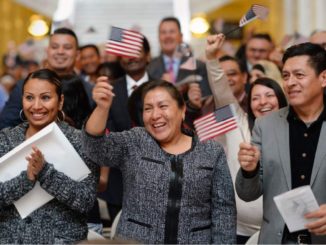
Texas Tribune
Hispanics rarely win seats on Texas’ two highest courts. Some experts blame the “surname challenge.
Elsa Alcala showed up to the straw poll confident.
There was a ways to go before the 2012 Republican primary for Texas Court of Criminal Appeals Place 8, and she believed she was the better candidate. She had a strong resume, the advantage of the incumbency and the support of her party.
And unlike her opponent, Ken Law, she’d shown up at the Tarrant County Candidate Fair that February day in Fort Worth. Along with her husband and three kids, she had set up a table and handed out push cards to attendees, urging them to re-elect her to Texas’ highest criminal court. Law had no one there on his behalf, Alcala noted, and he lacked the advantages of incumbency. He had also been fined $4,100 by the Texas Ethics Commission a few years earlier.
But Alcala believes Law had one advantage: his last name. “Law” is simple, familiar, fitting for a judge and, perhaps most importantly, sounds Anglo-Saxon.
When voting closed, Law had won by more than 10 percentage points. The organizer of the event tracked down Alcala and apologized.
“It was just shocking — it was a shock to my confidence,” Alcala said. “I thought to myself that if the choice was between the name ‘Ken Law’ versus the name ‘Elsa Alcala’ in front of an uneducated voter, that I was going to lose.”
Many would say her doubts were well-founded. In Texas, not many Hispanic judges have won election to the state’s highest courts — the state Supreme Court and the Court of Criminal Appeals. A leading theory among GOP pollsters, operatives and political observers is that those candidates are disadvantaged by their last names.
The system of statewide, partisan judicial elections means that candidates have to muster broad appeal, but the little attention paid to their campaigns means voters rarely know who the candidates are. With no information about the candidates they’re choosing between, voters often lean toward the names that sound more familiar — the names more like their own, experts said.
Among Republican primary voters in Texas, that generally means the names that sound white.
“My bottom line is that Hispanic candidates start out at a slight disadvantage against non-Hispanic candidates because of their name,” said Mike Baselice, a longtime pollster for Republicans in Texas. “An unfunded or a very low-funded campaign by a Hispanic Republican for either the state Supreme Court or the Court of Criminal Appeals is a tough proposition.”
No Hispanic judge has ever won election to the state’s two highest courts without first being appointed to their seat by a governor. And in the history of the two nine-member courts, there have been only seven Hispanic judges, with no more than three serving simultaneously. That’s in a state where Hispanics now make up about 39 percent of the population.
Lawyers in a recent federal lawsuit challenging Texas’ system of statewide judicial elections have attributed that lack of electoral success to the “surname challenge.”
Skeptics argue that a Hispanic-sounding surname didn’t prevent Supreme Court Justice Eva Guzman from winning two full terms. But the challenge is part of the reason Alcala won’t seek re-election in 2018.
“I thought it was likely that I would draw an opponent because someone would view my Hispanic unfamiliar surname as a liability,” she wrote recently in a deposition for the case.
“And the risk I might lose the campaign was just not worth it to me,” she told the Tribune this week.
A history of underrepresentation
Alcala did win re-election in 2012. Law was forced off the ballot because he failed to gather enough valid signatures on his petition to run, leaving Alcala unopposed in the primary race. Now, there are two Hispanic judges on the courts. After Alcala finishes her term this year, that number could dwindle to one.
Both courts are entirely Republican, meaning judges are effectively elected in Republican primaries. But even with the advantage of incumbency — and the support of the Republican establishment — it’s not uncommon for sitting Hispanic judges to lose to white challengers.
It’s a phenomenon, experts say, that in Republican judicial primaries comes down to fundraising and a name. Though they’re statewide officials, these judges are relatively unknown to most voters, and the candidates rarely have enough money to introduce themselves to voters in a state of 28 million people. Often, the only information voters have are the names on the ballots.
“At the end of the day, you’re going to vote for the person that has a similar last name that maybe your neighbor has,” said George Antuna, co-founder of the Hispanic Republicans of Texas.
That’s proved to be a hefty challenge for most Hispanic Republicans in statewide races, largely because only about 9 percent of Republican primary voters have Hispanic-sounding surnames, said Baselice, the Republican pollster.
Candidates can make up for that handicap if they raise enough money to barnstorm the state and get their names out, Baselice said. Republican U.S. Sen. Ted Cruz, who was first elected in a high-profile 2012 primary runoff, is a prime GOP example.
But statewide judicial races generally don’t attract the same kind of attention or campaign money needed to reach voters in a massive state with about 20 different media markets.
“An overwhelming majority of Republican primary voters are Anglos,” said Mark Jones, a Rice University political science professor who has studied judicial elections in Texas. “If all they know about the candidates is that one has an Anglo surname and one has a Latino surname, there’s a tendency among voters — given no other information — to vote for the candidate that shares their [ethnicity].”
Over the years, this has resulted in several incumbent Hispanic judges losing their seats in low-profile statewide primary races. That trend is particularly pronounced among Supreme Court justices.
Xavier Rodriguez, a Texas Supreme Court appointee of former Gov. Rick Perry, lost the 2002 Republican primary to Steven Wayne Smith. In 2012, former Texas Supreme Court Justice David Medina lost the seat he’d held for eight years to John Devine, even though Medina had endorsements from the Texas governor and attorney general. (Medina and his wife had been indicted in a 2008 arson case, but a district attorney threw out the charges and the foreman of the grand jury that reviewed them called the charges politically motivated.)
Two Houston lawyers said at the time that Devine told them he targeted Medina in particular because he thought “I can beat a guy with a Mexican last name.” Devine has denied those allegations.
From 2000 to 2016, only one other incumbent on the Texas Supreme Court was defeated.
The “surname challenge”
Texas is not the only state that elects its highest judges in a partisan statewide system, but that practice has long drawn criticism. Former justices themselves are among the most vocal critics of the system, arguing it puts judges — who must rule impartially — in the difficult position of having to run with a partisan bent.
Filed on behalf of seven Hispanic voters and a community organization, a federal lawsuit challenges the system on different grounds. Statewide judicial elections, the plaintiffs’ lawyers argue, dilute the voting power of Texas Hispanics. That dilution is compounded, an expert for the plaintiffs argues, by the “surname challenge” in which a large number of white voters will not support candidates with Hispanic-sounding surnames even if they are the incumbents.
Plaintiffs’ lawyers have pointed to the overwhelming underrepresentation of Hispanic judges on Texas’ two highest courts as proof that the current system makes it more difficult for Hispanics to elect their candidates of choice. Voters’ preferred candidates don’t have to be of their same race or ethnicity, but it’s often the case for Latino voters, attorneys argue.
But the state’s lawyers in the case argue that partisanship — and not race — explains the makeup of the courts.
Perhaps their best argument is Guzman’s electoral success. When she sailed to a seat on the state Supreme Court in 2010, she became the first Latina elected to statewide office in Texas. She also threw a wrench in the plaintiffs’ case.
“An inconvenient fact for the plaintiffs is that following fact: Eva Guzman has won two statewide elections,” Patrick Sweeten, the state’s lead attorney in the voting rights lawsuit, told the court earlier this month.
In 2016, Guzman was the highest vote-getter in a Texas Republican primary, winning 1.27 million votes in her victory over Dallas attorney Joe Pool. A prolific fundraiser who pulled in an unusual $1.1 million for her 2016 campaign, her success is often touted as evidence that Hispanic Republicans do not face race-related obstacles.
Guzman herself says “a lot of other forces other than surname” — mostly the nature of statewide races that require candidates to reach millions of voters — impact the outcome of judiciary races.
“I don’t think that we have a party that will not support Hispanics,” Guzman told The Texas Tribune. “But I think judicial Hispanic candidates have a much higher burden when it comes to voter contact.”
But Alcala said even the comparatively slight difference in visibility between Texas Supreme Court and Court of Criminal Appeals races can matter when voters cast their ballots. Court of Criminal Appeals candidates are lower-profile, forcing more uninformed voters to end up making choices based on names, Alcala said.
The “surname challenge” may be tested in next week’s Republican primary for Alcala’s seat on the court.
In the three-way Republican race to replace her, there’s one minority candidate: a Latina who served as president of the Hispanic Law Students Association at the University of Houston Law Center and who helped found the Galveston chapter of the Hispanic Republicans of Texas. Of the three candidates, she has the most cash on hand and the most high-profile endorsements, including one from the powerful conservative group Empower Texans.
She said she’s never felt like race was a disadvantage in prior elections, but she does have one notable advantage over other Hispanic candidates: Her name is Michelle Slaughter.
She won this year’s Tarrant County straw poll in a landslide.
This article appeared originally on Texas Tribune with the title In Texas Republican judicial primaries, do Hispanic-sounding surnames spell loss?



